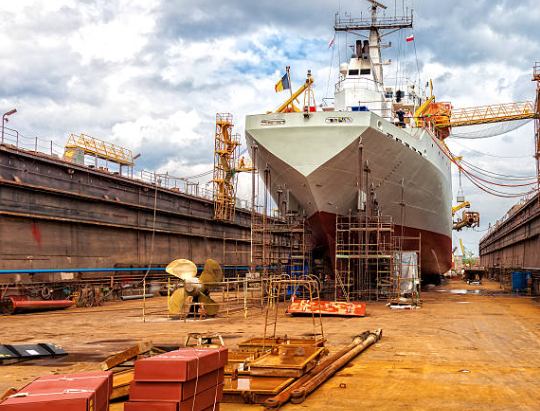
Posted on Friday, September 27, 2024
With the need for large structural components that meet exact specifications, roll forming technology has become an essential tool in streamlining production processes. Roll forming machines offer several key benefits that not only improve efficiency but also contribute to the long-term reliability of ships and offshore platforms. In this blog, we’ll explore how roll forming technology is shaping the shipbuilding industry.
One of the most significant advantages of using roll forming machines in shipbuilding is the precision they offer. Roll forming allows manufacturers to produce metal components with exact dimensions, ensuring that each part fits seamlessly into the overall design of the ship. Whether it’s beams, frames, or panels, the ability to customize these components to meet strict specifications improves the quality of the finished ship and reduces the risk of errors during assembly.
The ability to produce custom shapes and sizes is particularly important in shipbuilding, where different ships require unique structural elements based on their design and purpose. Roll forming machines can be programmed to produce a variety of profiles, making them versatile enough to meet the needs of both large-scale commercial vessels and smaller, specialized ships.
Ships and offshore platforms operate in some of the harshest environments on Earth, with constant exposure to saltwater, wind, and extreme weather conditions. The structural components used in shipbuilding need to be highly durable and resistant to corrosion. Roll forming machines produce metal parts with consistent thickness and strength, ensuring that these components can withstand the demanding conditions of marine environments.
The precision of roll forming also means that parts are manufactured with uniform quality, reducing the risk of weak points or defects that could lead to structural failure. This level of durability is crucial for ships that are expected to have long service lives with minimal maintenance.
In an industry where meeting tight deadlines is essential, roll forming machines offer a significant advantage by streamlining the production process. Unlike traditional methods that may require multiple stages of fabrication, roll forming is a continuous process that allows for the rapid production of metal components. This results in faster lead times for shipbuilders, enabling them to meet project deadlines without compromising on quality.
Automation plays a key role in this efficiency. Modern roll forming machines can operate with minimal human intervention, reducing labor costs and eliminating the risk of human error. With the ability to produce large quantities of structural components in a short period, shipyards can maintain a steady supply of materials, ensuring that construction projects stay on schedule.
Material efficiency is another critical factor in shipbuilding, where large amounts of metal are required for construction. Roll forming machines are designed to optimize material usage, producing components with minimal waste. This not only reduces costs but also supports sustainability efforts within the industry by minimizing the amount of scrap metal that needs to be recycled or discarded.
By producing components with precise dimensions, roll forming machines also eliminate the need for excessive trimming or reworking, further reducing waste. This level of efficiency is particularly important in large-scale shipbuilding projects, where even small reductions in material waste can result in significant cost savings.
In addition to shipbuilding, roll forming technology is widely used in the construction of offshore platforms. These structures, which support oil rigs, wind turbines, and other marine installations, require the same level of precision and durability as ships. Roll formed components are used in the construction of the platform’s foundation, support beams, and structural frameworks.
Offshore platforms are subjected to constant stress from oceanic forces, making it critical that the metal components used in their construction are strong, reliable, and resistant to corrosion. Roll forming machines ensure that these components are manufactured to meet the highest standards of quality and performance, helping to extend the lifespan of offshore installations.
Roll forming machines are revolutionizing the shipbuilding industry by offering a combination of precision, durability, and efficiency. From producing custom structural components to reducing material waste and streamlining production processes, roll forming technology is helping shipbuilders meet the growing demand for high-quality vessels and offshore platforms.
As the marine industry continues to evolve, the role of roll forming machines in producing durable and cost-effective components will only become more critical. By investing in advanced roll forming equipment, shipyards can enhance their production capabilities, reduce costs, and improve the overall quality of their projects.
This blog covers the key advantages of roll forming in shipbuilding, positioning the technology as a game-changer for manufacturers looking to improve efficiency and meet the demands of modern marine construction projects.
4o

Used Purlin Roll Forming Machines for Sale Worldwide
Posted on Sunday, January 25, 2026
Pre-Owned Roll Forming Machines for Purlin & Structural Steel Profiles

Used Roof Panel Roll Forming Machines for Sale Worldwide
Posted on Sunday, January 25, 2026
Pre-Owned Roll Forming Machines for Roofing Panel Production

Used Roll Forming Machines for Sale Worldwide
Posted on Tuesday, January 20, 2026
Pre-Owned Roll Forming Machines with Inspection, Verification & Global Support

Steel Coil Supply for Roll Forming Machines Worldwide
Posted on Tuesday, January 20, 2026
Reliable Steel Coil Supply for Roll Forming, Fabrication & Manufacturing Applications
Copyright 2026 © Machine Matcher.